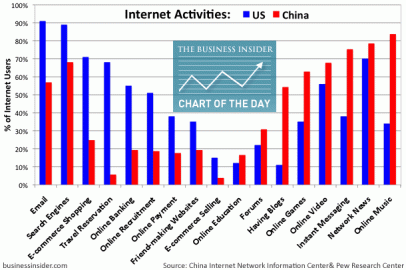Happy 60th birthday Communist China! And how well timed, the IPA seminar this week on the “Digital Dragons” – a view on the rise and future of digital culture in Japan and China.
While I’ve always looked at Japan as the apotheosis of digital innovation and sometimes just plain digital wierdness, there were a couple of interesting insights into the emergence of China as a major player in the digital space and the development of the Chinese digital consumer.
Firstly is the sheer size of the Chinese internet market – 300m people online, 700m mobile subscribers, 120m with access to the mobile web – by far the largest global
And yet, that still leaves hundreds of millions unconnected, making China a microcosm of the world, encompassing superconnected first world consumers in the big 21st century cities like Shanghai right the way down to peasantry living in much the same way as they have for hundreds of years. It’ll be interesting to see how this digital divide will develop, and whether there will be impetus to change or to maintain the status quo.
Then when you look at how chinese audience engages online, and how society has shaped this this behaviour, things get really interesting.
Amongst broadband users the Chinese now spend more time online than any other country. Hard to believe, but here’s the data to back it up – they outstrip even the supposedly super-connected Japanese.
And how do they spend this time? To a large extent, on social interactions.
In comparison to their Western counterparts, Chinese internet consumers connect with more people, are more likely to contribute to online conversations and are more likely to use the mobile web.
You can see from the graph above that Chinese internet usage is majorly skewed towards social activities like instant messaging, social networking, gaming and sharing video and music. Compare this to US users, who are much more into emailing, searching and buying.
The reason? One very plausible theory points to China’s one child policy, which has resulted in a generation of one child families. And it’s all these only children who are turning to the internet for companionship and social interaction.
And I think it’s reasonable to assume that it’s this hyperconnected, supersocial generation that is shaping the capitalisation of 21st century China.
I wonder what Mao would make of it today – that one the landmark policies of his Communist project could, in the 21st century, be instrumental in reshaping his beloved People’s Republic.
Filed under: Uncategorized, insight, trends
